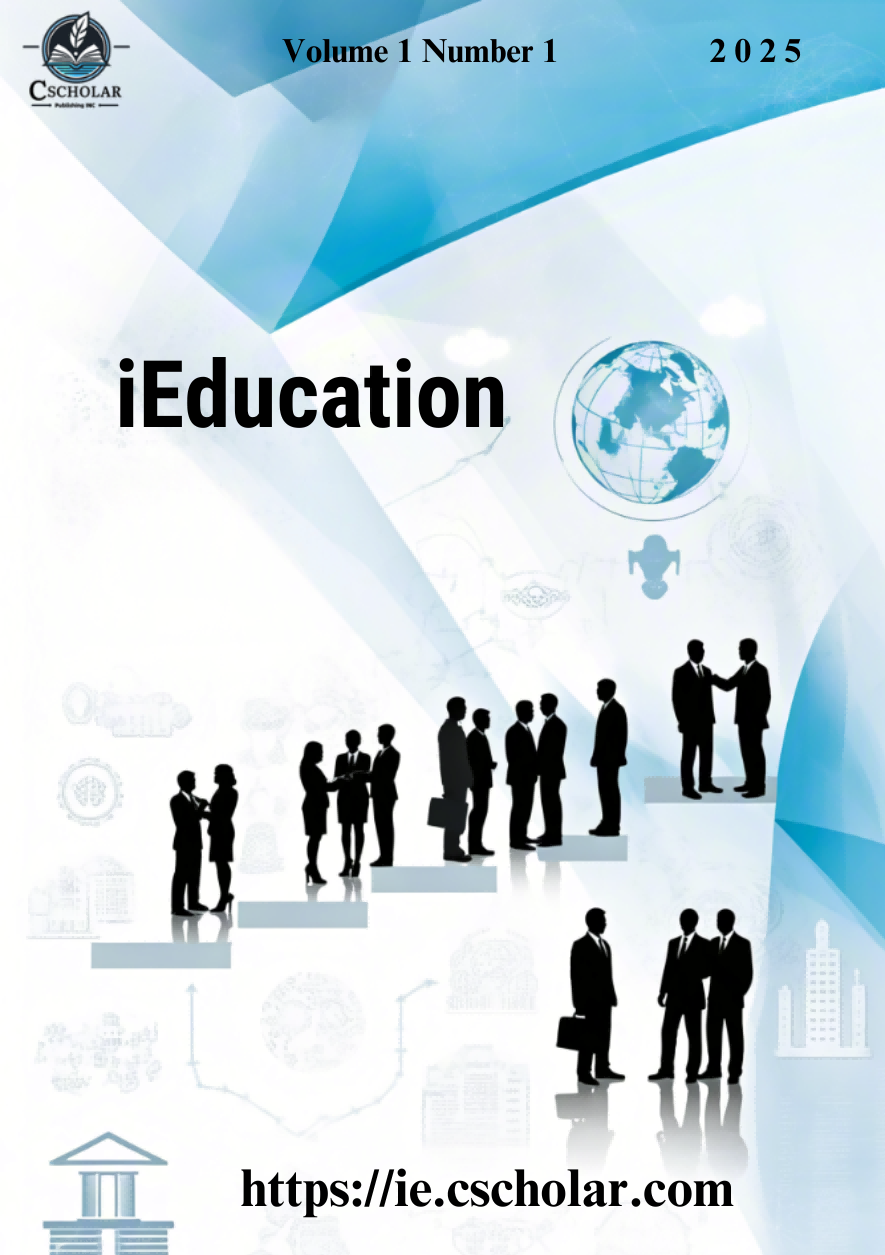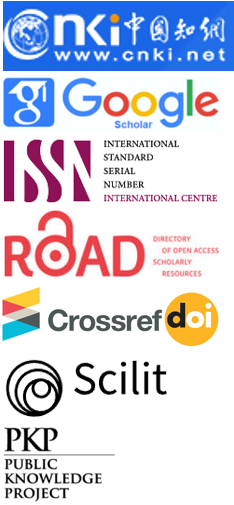The Effects of Parental Support on Chinese High School Students' Self‐Regulated Learning Ability--Chain Mediation of Sense of Meaning in Life and Psychological Resilience
DOI:
https://doi.org/10.71204/yvmm7a34Keywords:
Parental Support, Sense of Meaning in Life, Psychological Resilience, Self‐Regulated Learning Ability, Chain MediationAbstract
The purpose of this study was to investigate the effects of high parental support on Chinese high school students' self‐regulated learning ability, as well as the mediating roles of meaning in life and psychological resilience between parental support and self-regulated learning ability. A questionnaire method was used to survey 39,953 sophomore high school students in a central Chinese province. Structural equation modeling was used to explore the relationship between parental support, sense of meaning in life, psychological resilience, and self‐regulated learning ability. The results show that parental support directly affects the self-regulated learning ability of high school students. Meanwhile, parental support not only indirectly affects self-regulated learning ability through sense of meaning in life and psychological resilience, but also affects high school students' self-regulated learning ability through the chain mediating effect of sense of meaning in life and psychological resilience. The results of Bootstrap show that the mediating effect in the model is significant. By exploring the intrinsic mechanism of parental autonomy support affecting self-regulated learning ability, and at the same time revealing the importance of sense of meaning in life and psychological resilience in students' development, we provide empirical evidence for parents to guide and help their children to develop self-regulated learning ability.
References
Bandura, A. (1973). Aggression:A social learning analysis. Prentice-Hall.
Baumeister, R. F. (1991). Meanings of life. New York: Guilford Press.
Brassai, L., Piko, B. F., & Steger, M. F. (2013). Individual and parental factors related to meaning in life among hungarian minority adolescents from romania. International Journal of Psychology, 48(3), 308-315.
Bronfenbrenner, U. (1979). The Ecology of Human Development:Experiments by Nature and Design. Massachusetts: Harvard University Press.
Cai, H., & Yu, Q. (2024). The effect of self-perceived learning needs on self-regulated learning and learning outcomes in an EFL listening course.
Cohen, S., & Wills, T. A. (1985). Stress, Social Support, and the Buffering Hypothesis Psychologi cal Bulletin, 98(02), 310-357.
Çolak, T. S., N.A. Arıcı-Özcan, & Peker, A. (2021). The Mediation Role of Personal Meaning Profile in The Relationship Between Resilience Capacity and Meaning in Life Participatory Educational Research, 8(3), 252-267.
Connor, K. M., & Davidson, J. R. T. (2003). Development of a new resilience scale: the connor-davidson resilience scale (cd-risc). Depression & Anxiety, 18(2), 76-82.
Crumbaugh, J. C., & Maholick, L. T. (1964). An experimental study in existentialism:The psychometric approach to Frankl's concept of noogenic neurosis. Journal o/Clinical Psychology, 20(2), 200-207.
Deci, E. L., & Ryan, R. M. (1985). Intrinsic motivation and self-determination in human behavior. New York: NY: Plenum.
Deslauriers, L., McCarty, L. S., Miller, K., Callaghan, K., & Kestin, G. (2019). Measuring actual learn ing versus feeling of learning in response to being actively engaged in the classroom. Proceedings of the National Academy of Sciences, 116(39), 19251–19257.
Din, I. D. M. (2015). Effects of self-directed learning readiness, resilience, and competencies on learning motivation of postgraduate students in Malaysian research universities. (Master), Universiti Putra Malaysia,
Dunn, M. G., & Obrien, K. M. (2009). Psychological Health and Meaning in LifeStress, Social Support, and Religious Coping in Latina/Latino Immigrants Hispanic Journal of Behavioral Sciences, 31(2), 204-227.
Erdogan, T., & Senemoglu, N. (2016). Development and validation of a scale on self-regulation in learning (SSRL). SpringerPlus, 5(1686 ), 1-13.
Feng, Y. (2020). Structural equation modeling: Applications using Mplus. Wiley.
Furman, W., & Buhrmester, D. (1985). Children's perceptions of the personal relationships in their social networks. Developmental psychology, 21(6), 1016.
Gao, B. C., Liu, R. D., Wang, D., He, M. J., & Zhen, Y. (2011). Types of self-regulated learning of junior middle school students and their influence on learning Psychological Development and Education.
Gavarkovs, A. G., Crukley, J., Miller, E., Kusurkar, R. A., Kulasegaram, K., & Brydges, R. (2023). Effectiveness of life goal framing to motivate medical students during online learning: A randomized controlled trial. Perspectives on Medical Education, 12(1), 444–454.
Ha, J., & Kim, J. (2016). Mediating effect of social support and meaning of life in relationship between gender role conflict and posttraumatic growth of middle-aged female single parents The Korean Journal of Counseling and Psychotherapy, 28(4), 1023-1046.
Hair, J. F., Black, W. C., & Babin, B. j. (2010). Multivariate data analysis: A global perspective. London: Pearson Education.
Heastie, S., Dempsey, V., Katayama, A., & Yura, E. D. M. (2022). Relationships and differences on self-regulated learning, parental involvement, homework, and academic achievement, among high school students in rural west virginia.West Virginia University.
Karaman, P. (2024). Effects of using rubrics in self-assessment with instructor feedback on pre-service teachers’ academic performance, self-regulated learning and perceptions of self-assessment. European Journal of Psychology of Education, 3, 2551-2574.
Kovacs, K. E., & Dan, B. (2022). Is resilience a trait or a result of parental involvement? The results of a sys-tematic literature review Educ Sci, 12(6), 372-388.
Krause, N. (2007). Evaluating the Stress-Buffering Function of Meaning in Life Among Older People. Journal of Aging and Health, 5, 792-812.
Kumpfer, K. L. (2002). Factors and Processes Contributing to Resilience. In Resilience and Development: Positive Life Adaptations. 179-224.
Lee, H. J., & Kwon, S. (2013). Effect of Ego-Resilience and Peer Attachment upon Self-Regulation Learning Ability In Early Adolescence : The Mediating Effect of Life Satisfaction. The Journal of the Korea Contents Association, 13, 347-355.
Lee, R. K. Y., Bernard, Y. N. N., & Chen, M. D. (2024). Encourage self-learning and collaborative learning through gamification during COVID-19 pandemic: A case study for teaching biochemistry. Biochemistry and molecular biology education : a bimonthly publication of the International Union of Biochemistry and Molecular Biology.
Li, J. B., Salcuni, S., & Delvecchio, E. (2019). Meaning in life, self-control and psychological distress among adolescents: A cross-national study. Psychiatry research, 272, 122-129.
Li, Q., Wang, D., & Qin, G. (2025). Multiple attachment perspectives: the relationship between interpersonal attachment from family and school environments and children’s learning engagement. . BMC Psychol, 13(1), 314.
Lim, J., Yang, J. W., Song, M. H., & Park, J. (2024 ). Self-Study and Discussion Promote Students’ Science Learning. . Science & Education (prepublish), 1-19.
Loeng, S. (2020). Self‐directed learning: A core concept in adult education. Education Research International, 2020(1), 3816132.
Luthar, S. S. (2015). Resilience in development: A synthesis of research across five decades. Developmental psychopathology: Volume three: Risk, disorder, and adaptation, 739-795.
Maltais, C., Bouffard, T., Vezeau, C., & Dussault, F. (2021). Does parental concern about their child performance matter? Transactional links with the student's motivation and development of self-directed learning behaviors. Social Psychology of Education, 4, 1-22.
Martin, J. (2004). Self-regulated learning, social cognitive theory, and agency. Educational Psychologist, 39(2), 135-145.
Maslow, A. H. (1943). A theory of human motivation. Psychological Review, 50, 370.
Miao, M., & Cao, R. (2024). Mutually beneficial relationship between meaning in life and resilience. Current Opinion in Behavioral Sciences, 58, 101409.
Mohammadi, M. (2024). Digital information literacy, self-directed learning, and personal knowledge management in critical readers: Application of IDC Theory. Research and Practice in Technology Enhanced Learning, 19(4), 1.
Murakami, K. (2021). Learning in retirement: developing resilience and becoming a resourceful practitioner of life. Learning Culture and Social Interaction, 28, 100463.
Nicol, D. J., & Macfarlane-Dick, D. (2006). Formative assessment and self‐regulated learning: a model and seven principles of good feedback practice. Studies in Higher Education, 31(2), 199-218.
Nota, S., Soresi, B. J., Zimmerman, & (2004). Self-regulation and academic achievement and resilience: a longitudinal study. International Journal of Educational Research 2004(41), 198-215.
Panadero, E., Jonsson, A., & Botella, J. (2017). Effects of self-assessment on self-regulated learning and self-efficacy: Four meta-analyses. Educational Research Review, 22, 74-98.
Pierce, G. R., Sarason, B. R., & Sarason, I. G. (1996). Handbook of Social Support and the Family. . New York,NY, US: Plenum Press.
Plexico, L. W., Erath, S., Shores, H., & Burrus, E. (2019). Self-acceptance, resilience, coping and satisfaction of life in people who stutter. Journal of Fluency Disorders, 59, 52-63.
Podsakoff, P. M., MacKenzie, S. B., & Lee, j.-Y. (2003). Common method biases inbehavioral research: A critical review of the literature and recommended remedies. Journal of Applied Psychology, 88(5), 879-903.
Rager, & Kathleen, B. (2003). The self-directed learning of women with breast cancer. Adult Education Quarterly, 53(4), 277-293.
Reker, G. T., & Fry, P. S. (2003). Factor structure and invariance of personal meaningmeasures in cohorts of younger and older adults Personality and Individual Differences, 35(5), 977-993.
Richardson, M., Abraham, C., & Bond, R. (2012). Psychological correlates of university students' academic performance: A systematic review and meta analysis. Psychological Bulletin, 138(2), 353-387.
Ryff, C. D., & Singer, B. (1998). The role of purpose in life and personal growth in positive human health. Lawrence Erlbaum Associates Publishers.
Seon, Y., & Smith-Adcock, S. (2023). Adolescents’ meaning in life as a resilience factor between bullying victimization and life satisfaction. 148.
Steger, M. F. (2009). Meaning in life. Encyclopedia of Adolescence, 3, 1666-1677.
Tinajero, C., Castelo, A. M., Guisande, M. A., & Páramo, M. F. (2010). Self-regulated learning in female students with different cognitive styles: An exploratory study. Perceptual and Motor Skills, 111(1), 31–44.
Wang, Q., Pomerantz, E. M., & Chen, H. (2007). The role of parents' control in early adolescents' psychological functioning: a longitudinal investigation in the United States and China. Child development, 78(5), 1592–1610.
Wang, W. (2012). Parenting Styles, Parental Instructions and Children's Self-regulated Learning Behaviors in Canada and China (Doctor), Trent University (Canada),
Whittaker, A. E., & Robitschek, C. (2001). Multidimensional family functioning: Predicting personal growth initiative. Journal of Counseling Psychology 48(4), 420–427.
Xu, M., Benson, S. N. K., Mudrey-Camino, R., & Steiner, R. P. (2010). The relationship between parental involvement, self-regulated learning, and reading achievement of fifth graders: a path analysis using the ecls-k database. Social Psychology of Education, 13(2), 237-269.
Yang, R., Gao, Y., & Ji, Z. (2023). The relationship between self-regulated learning, mindful agency, and psychological resilience in Chinese master of nursing specialists: A cross-sectional study. Frontiers in Psychology, 14,1066806 .
Yuen, M., & Datu, J. A. D. (2020). Meaning in life, connectedness, academic self-efficacy, and personal self-efficacy: A winning combination. School Psychology International, 42(1), 79-99.
Zakariya, Y. F. (2022). Cronbach’s alpha in mathematics education research: Its appropriateness, overuse, and alternatives in estimating scale reliability. Frontiers in Psychology, 13, 1074430.
Zhang, H., & Whitebread, D. (2017). Linking parental scaffolding with self-regulated learning in chinese kindergarten children. Learning and Instruction, 49, 121-130.
Zimmerman, B. J. (2000). Attaining self-regulation: A social cognitive perspective. San Diego, California: Academic Press.
Zimmerman, B. J., & Martinez-Pons, M. (1988). Construct validation of a strategy model of student self regulated learning. Journal of Educational Psychology, 80, 284–290.
Downloads
Published
Issue
Section
License
Copyright (c) 2025 Yue Wang (Author)

This work is licensed under a Creative Commons Attribution 4.0 International License.
All articles published in this journal are licensed under the Creative Commons Attribution 4.0 International License (CC BY 4.0). This license permits unrestricted use, distribution, and reproduction in any medium, provided the original author(s) and source are properly credited. Authors retain copyright of their work, and readers are free to copy, share, adapt, and build upon the material for any purpose, including commercial use, as long as appropriate attribution is given.








